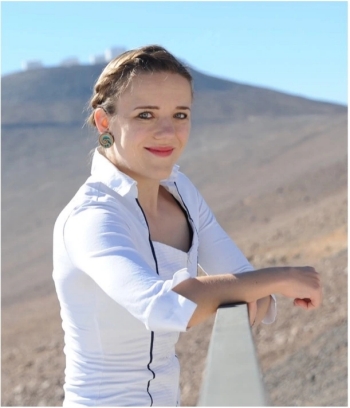Congratulations to ESO Fellow Julia V. Seidel on being awarded the prestigious 2024 MERAC Prize for the Best Doctoral Thesis in Observational Astrophysics! A well-deserved honor for her exceptional groundbreaking research on climate and atmospheric circulation regimes of exoplanets.
ESO Fellow Julia V. Seidel Awarded the MERAC Prize to the Best Thesis on Observational Astrophysics

Julia Seidel's journey in astrophysics began with an MSc in Physics from Imperial College London in 2017, followed by a remarkable PhD in astronomy and astrophysics from the University of Geneva in 2021 under the supervision of Professors David Ehrenreich and Vincent Bourrier. Her dedication and excellence in research were recognized with the 2022 Edith A. Müller award for the best Swiss PhD thesis in astronomy.
She joined ESO in 2021 as a fellow in Chile with duties in Paranal, where she continued devoting her efforts to both observational and theoretical research on exoplanets climate. Through her innovative approaches, Julia Seidel has shed light on the climates and atmospheric circulation regimes of extreme exoplanets, employing high-resolution spectrographs such as HARPS and ESPRESSO. Furthermore, Julia Seidel’s expertise extends to studying the impact of climate change and El Niño phenomenon on telescope sites, demonstrating her commitment to addressing complex scientific challenges.
Besides Julia Seidel's achievements, ESO is also happy to have played a part in the careers of other distinguished scientists having been awarded well-deserved recognitions in this year's prizes of the Europan Astronomical Society.
- The Tycho Brahe medal, awarded in recognition of the development or exploitation of European instruments, was awarded to the Swiss astrophysicist Francesco Pepe (University of Geneva, Switzerland) for the development and exploitation of ultra-stable high-resolution spectrographs which revolutionised the detection and characterisation of small-mass exoplanets, among them HARPS and NIRPS at the La Silla observatory and ESPRESSO at Paranal observatory.
- The Lodewijk Woltjer Lecture, honouring astronomers of outstanding scientific distinction, was awarded to Roland Bacon (CRAL/CNRS/ENS de Lyon/Claude Bernard Lyon 1 University, France) for the development of integral field spectroscopy as a core technique in observational astrophysics and its application to a wide range of problems, in particular galaxy evolution, in which the VLT integral field spectrograph MUSE is playing an outstanding role.
- And last but not least, the Fritz Zwicky Prize for Astrophysics and Cosmology, awarded biennially by the European Astronomical Society on behalf of the Fritz Zwicky Foundation to recognize scientists who have obtained fundamental and outstanding results related to astrophysics and cosmology, was awarded to former ESO Director General Catherine Cesarsky (CEA Saclay, France) for outstanding contributions to the understanding of the evolution of galaxies via space infrared observations and for her leadership in shaping the observational infrastructure of contemporary astronomy.
